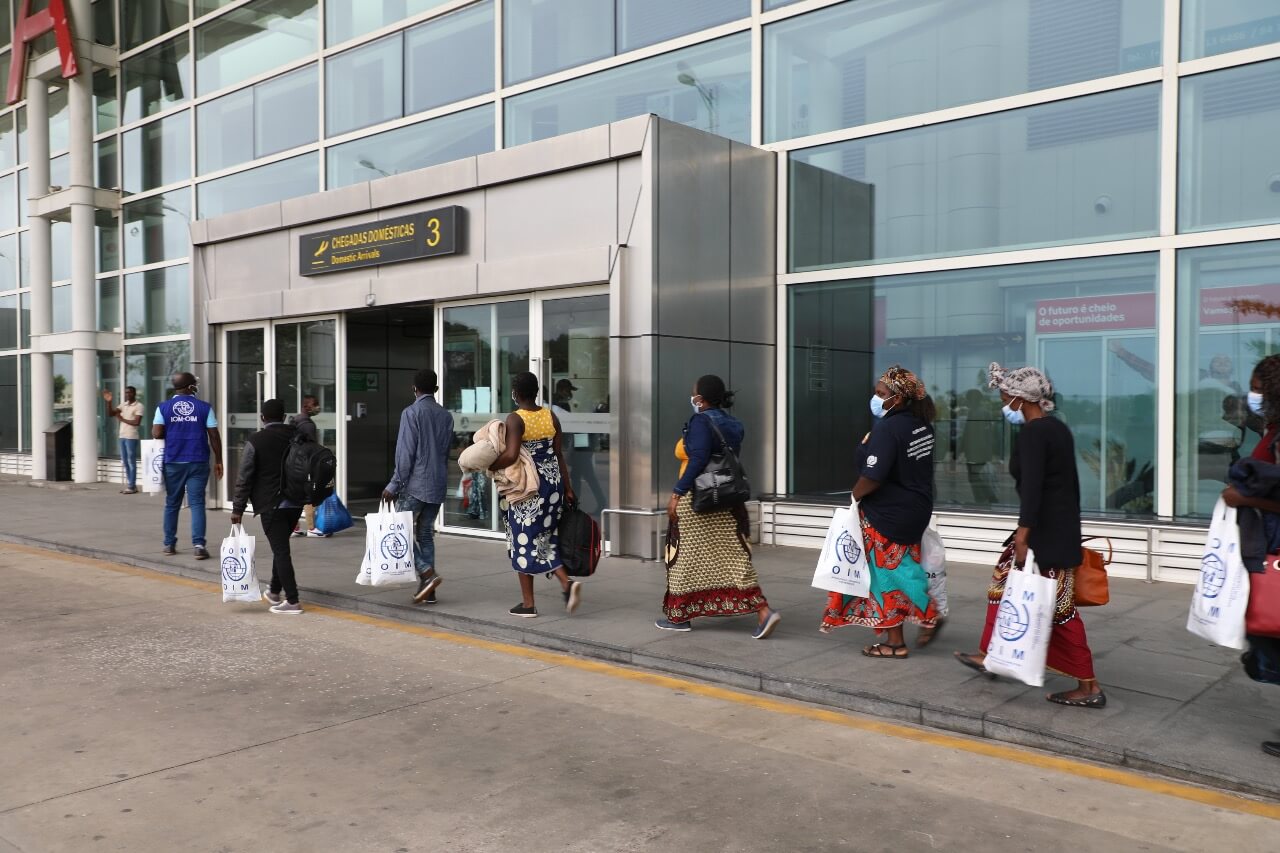
Stranded Malawian Migrants receive support to voluntarily returns
Due to difficulty of making a living during COVID-19 period, they decided to return and reunite with family members, however the return trip was more complex than expected
Stranded in southern Mozambique after crossing the South Africa border, 52 Malawian migrants received support from IOM to voluntarily return home over the past six days. Travelling to Malawi by bus from South Africa to the Mozambique border, the vulnerable migrants, in separate groups, were all stopped in the area of Ressano Garcia checkpoint in Maputo Province due to irregular crossing and incomplete travel documents.
The Malawians had been working in South Africa, some for months, others for years. Due to the difficulty of making a living during the COVID-19 period, they decided to return and reunite with family members, however the return trip was more complex than expected.
The majority of the migrants spent more than two weeks in Ressano Garcia, first at a border police holding facility, and then at a hotel arranged by IOM. During the stay in Ressano Garcia, IOM provided food and clothing for some of the migrants who were identified as in need of assistance. Medical care was provided to two pregnant women as part of pre-departure assistance, to determine if they were fit to travel.
Several individuals lacked passports; IOM coordinated with the Malawi High Commission in Maputo to obtain emergency travel documents. The group of 52 migrants, including 41 men, 10 women and one child, requested to travel as soon as possible. Due to urgency, arrangements were quickly made for seats on commercial airlines from 2 October to 7 October, for the 1 hour 45-minute flight to Tete, Mozambique. IOM provided transportation to the Malawi border, a distance of approximately 90 km. National authorities, with support from IOM Malawi, provided the returnees with personal protective equipment (PPE) including face masks, alcohol hand sanitizer and onward transport assistance to their communities of origin. The return movement of the migrants was overseen and accompanied by Mozambique’s National Migration Service (SENAMI), with continued support from the Malawi High Commission in Maputo.
The economic impact of COVID-19 affects their employment prospects, and the essential remittances that migrants send to support their families
“Before COVID-19, the situation was okay. I lived in Johannesburg, from January to February I did piece work and sold clothes. But after the COVID-19 lockdown started in South Africa it was not possible to work. We were suffering due to lack of jobs,” said Chipango Domin, a migrant from Malawi. “It was therefore better to return to our country. I am very happy to go back and meet my baby, who I have only seen in pictures.”
The migrants’ work in South Africa ranged from welding, food and clothing sales, to housekeeping and tailoring. Upon arrival back home they aspire to work opportunities including as welders, drivers, or to start small clothing sales business.
IOM Mozambique Chief of Mission, Dr. Laura Tomm-Bonde said: “Migrants are especially vulnerable in this COVID-19 period. The economic impact of COVID-19 affects their employment prospects, and the essential remittances that migrants send to support their families. In cooperation with Mozambican authorities, IOM is pleased to offer assistance to the migrants to voluntarily return home.”
The High Commissioner of the Republic of Malawi in Mozambique, HE Frank Elias Viyazhi said, “This group of Malawian migrants along with many others are in precarious situations during this period; we must properly follow COVID-19 quarantine and prevention guidelines, while also facilitating regular migration movements, especially returns. We are pleased to work together with IOM in this effort.”
Upon departure from Maputo Airport, one of the Malawian migrants explained, “I went to work in South Africa because I needed money to pay for school fees, food and clothes for my daughters; it is difficult to afford expenses for four children,” said Domisani Msowoya. “I worked as a housekeeper but the family left in June because of COVID-19. I have not been home in three years. When I go back to Malawi we will start a business selling second hand clothes. My daughters say ‘Come home, we are waiting for you!’”
The last remaining migrant in the group departed Maputo Airport on 7 October. He joined three migrants who held over in Tete. This final contingent of four travelled together and returned on 8 October to Malawi.
The return was supported within the framework of the European Union-funded project “Southern Africa Migration Management” to respond to the protection and assistance needs of stranded and vulnerable migrants in the region impacted by COVID-19. Since June 2020, more than 1,000 stranded and vulnerable migrants have been assisted to return home safely.

